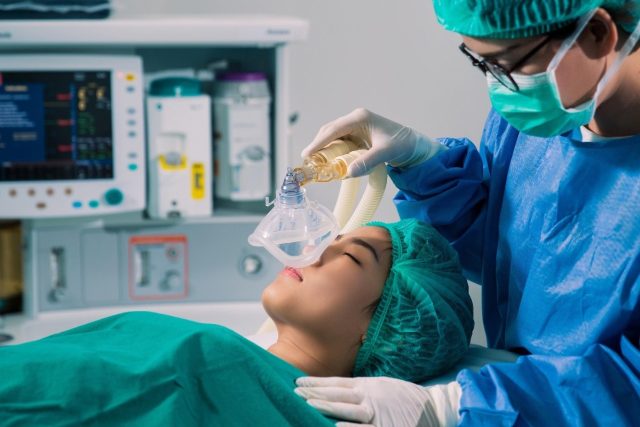By Beth Gilbert HealthDay Reporter
The annual meeting of the American Society of Anesthesiologists was held from Oct. 18 to 22 in Philadelphia, attracting approximately 5,000 participants from around the world, including anesthesiologists and other health care professionals. The conference featured presentations focusing on the latest advances in the relief of pain and total care of surgical patients prior to, during, and after surgery.
In one study, Ivie Izekor, of the Texas A&M College of Medicine in Bryan, and colleagues found a strong association between the number of surgeries a patient undergoes and their risk for malnutrition.
A total of 28,475,485 patients who underwent orthopedic surgery of any kind were identified through the National Inpatient Sample database between 2016 and 2019, including 1,853,360 (6.5 percent) who were diagnosed with malnutrition after admission. The researchers found that patients with more frequent surgeries were significantly more likely to be malnourished, which led to longer hospital stays, higher health care costs, and increased in-hospital mortality. For instance, patients with six to 10 surgeries had a 1.6 times greater risk for malnutrition, and those with 21 to 25 surgeries had more than a five times greater risk.
“The risk of malnutrition increases significantly with the number of surgeries,” Izekor said. “Mathematically, based on our study’s population, malnutrition-related mortality is higher than aspiration-related mortality.”
In another study, Elizabeth Pealy, M.D., of the University of Chicago Medicine, and colleagues aimed to determine the feasibility of administering the recently developed, pediatric-specific, computerized adaptive mental health assessment tool (KCAT) on pediatric surgical patients in the preoperative area. The authors also examined the prevalence of anxiety and depression in this population.
The researchers found that all 65 patients who were enrolled in the study and were scheduled for elective surgery were able to complete KCAT in an average of two minutes and 13 seconds. There were no major issues noted with performing this assessment in the preoperative area. The prevalence of preoperative anxiety was more than 50 percent, and preoperative depression was observed in about one-third of the patients who were screened.
“Using this tool to identify preoperative anxiety and/or depression will allow the patient’s care team to individualize management of these mental health issues preoperatively, intraoperatively, and postoperatively and focus resources on patients who could have the most benefit,” Pealy said.
Ryan C. Nicholson, M.P.H., of the Johns Hopkins University School of Medicine in Baltimore, and colleagues found that simple interventions such as treating a patient with a nonsteroidal anti-inflammatory drug (NSAID) around the time of surgery may reduce the incidence of postoperative delirium.
The medical records from a large database were assessed to identify patients who had surgery with anesthesia between 2014 and 2023. The researchers found that NSAIDs like ibuprofen reduced the incidence of postoperative delirium more than Tylenol when given before, during, or immediately after surgery. Furthermore, nonsalicylates were superior compared with salicylates in reducing the incidence of delirium. The reduction in delirium was most significant in patients older than 65 years, who have a higher risk for delirium due to comorbidities and age.
“We have been increasingly incorporating NSAIDs into our surgical recovery protocols. We routinely use medications like the nonsalicylate NSAID celecoxib for this purpose,” Nicholson said. “Additional research needs to be completed to identify NSAIDs that are most effective, the patient population we should target most, and exact timing of the intervention (pre-, intra-, or postoperative).”
ASA: Risk for Postoperative Delirium Increased With Poor and Worsening Sleep
FRIDAY, Oct. 25, 2024 (HealthDay News) — Inadequate sleep and worsening sleep trajectory are associated with postoperative delirium among adults undergoing noncardiac surgery under general anesthesia, according to a study presented at the annual meeting of the American Society of Anesthesiologists, held from Oct. 18 to 22 in Philadelphia.
Read Full Text
ASA: Fibrinogen-to-Albumin Ratio Is Risk Factor for Preeclampsia
THURSDAY, Oct. 24, 2024 (HealthDay News) — The fibrinogen-to-albumin ratio is an independent risk factor for development of any preeclampsia and preeclampsia with severe features, according to a study presented at the annual meeting of the American Society of Anesthesiologists, held from Oct. 18 to 22 in Philadelphia.
Read Full Text
ASA: Repeated Fasting Increases Malnutrition Risk in Patients Undergoing Multiple Surgeries
THURSDAY, Oct. 24, 2024 (HealthDay News) — Malnutrition is more likely among patients undergoing multiple orthopedic surgeries, according to a study presented at the annual meeting of the American Society of Anesthesiologists, held from Oct. 18 to 22 in Philadelphia.
Read Full Text
Copyright © 2024 HealthDay. All rights reserved.



















